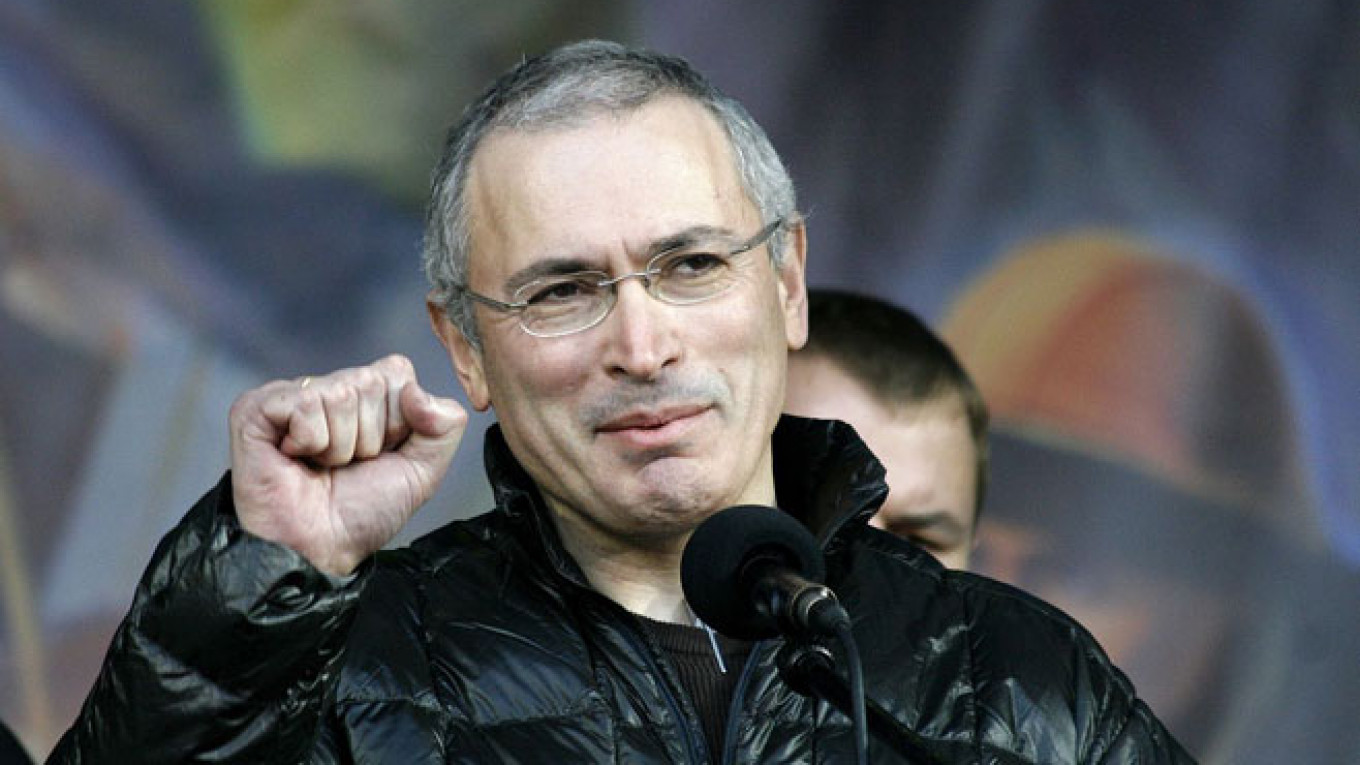Former oil tycoon Mikhail Khodorkovsky declared his ambition over the weekend to play a leading role in steering Russia down the path toward European-style democracy.
Khodorkovsky was released in December from a decade-long prison term stemming from tax evasion charges. He kept a relatively low profile in the months that have passed since his release, but came out in full swing over the weekend, making bold political statements in interviews with several European media outlets.
The former oil baron celebrated the relaunch of his political foundation Open Russia in Berlin on Saturday. The organization, which was essentially shut down in 2006 after a Moscow court froze its bank accounts, will work to coordinate between the scattered political and civic movements that comprise Russia's diverse opposition movement.
The organization will be guided by the principles of orienting Russia toward Europe, strengthening the rule of law in the country, and improving its electoral system, Khodorkovsky said in a statement over the weekend.
In an interview published Sunday by French newspaper Le Monde, Khodorkovsky indicated his willingness to lead the country through what he sees as its present crisis.
"I would not be interested in becoming Russia's president if my country was developing normally," he said. However, "if it appeared necessary to overcome the crisis and carry out constitutional reform, so as to redistribute presidential powers in favor of the judiciary, parliament and civil society, I would be ready to take on this part of the work," he told Le Monde.
Khodorkovsky believes the Russian government's is plagued by a lack of the sort of legitimacy that can only come from honest elections, he told the French paper.
He hopes to strengthen the country's political dialogue by creating an online structure that will aim to knit together opposition-minded groups and individuals that are dispersed broadly throughout the political landscape.
Open Russia will not be officially registered or have offices in the country.
"The actions that he [Putin] takes are clearly leading Russia along the patriarchal Asian path to development," he told Le Monde.
Open Russia's first electoral goal is to prevent "the most odious people" from taking up seats in the State Duma in 2016. Speaking at the relaunch, Khodorkovsky referred to the State Duma as "a bulwark of reactionaries."
Khodorkovsky said the organization is prepared to support any political hopeful that advocates for Russian development along the European model, regardless of the candidate's specific political affiliation, whether that advocacy is: "informational, ideological, organizational, and of course where it is possible, financial."
Khodorkovsky's net worth was estimated by Forbes Russia to stand at $170 million in 2014, a sizable fortune, even if only a fraction of his former financial glory. At the time of his 2003 arrest, the same publication reported his net worth was approximately $15 billion, making him the richest man in Russia at that point.
According to Khodorkovsky's statement at the relaunch celebration, Open Russia "does not get money from America; our compatriots provide us with funds."
Many Russian political analysts and pundits have argued that Khodorkovsky's arrest was driven by his ambition to challenge the power of President Vladimir Putin.
Notably, however, Putin himself signed the pardon that preceded the former oligarch's early release, telling reporters in December, "He has already spent more than 10 years in prison. That is a serious punishment."
Following his sudden release, Khodorkovsky promptly flew to Europe and has not since returned. When he declined to attend his mother's funeral in August, he cited fears that if he were to reenter the country, he may be deprived of the right to leave again. He currently resides in Switzerland with his family.
A Message from The Moscow Times:
Dear readers,
We are facing unprecedented challenges. Russia's Prosecutor General's Office has designated The Moscow Times as an "undesirable" organization, criminalizing our work and putting our staff at risk of prosecution. This follows our earlier unjust labeling as a "foreign agent."
These actions are direct attempts to silence independent journalism in Russia. The authorities claim our work "discredits the decisions of the Russian leadership." We see things differently: we strive to provide accurate, unbiased reporting on Russia.
We, the journalists of The Moscow Times, refuse to be silenced. But to continue our work, we need your help.
Your support, no matter how small, makes a world of difference. If you can, please support us monthly starting from just $2. It's quick to set up, and every contribution makes a significant impact.
By supporting The Moscow Times, you're defending open, independent journalism in the face of repression. Thank you for standing with us.
Remind me later.






